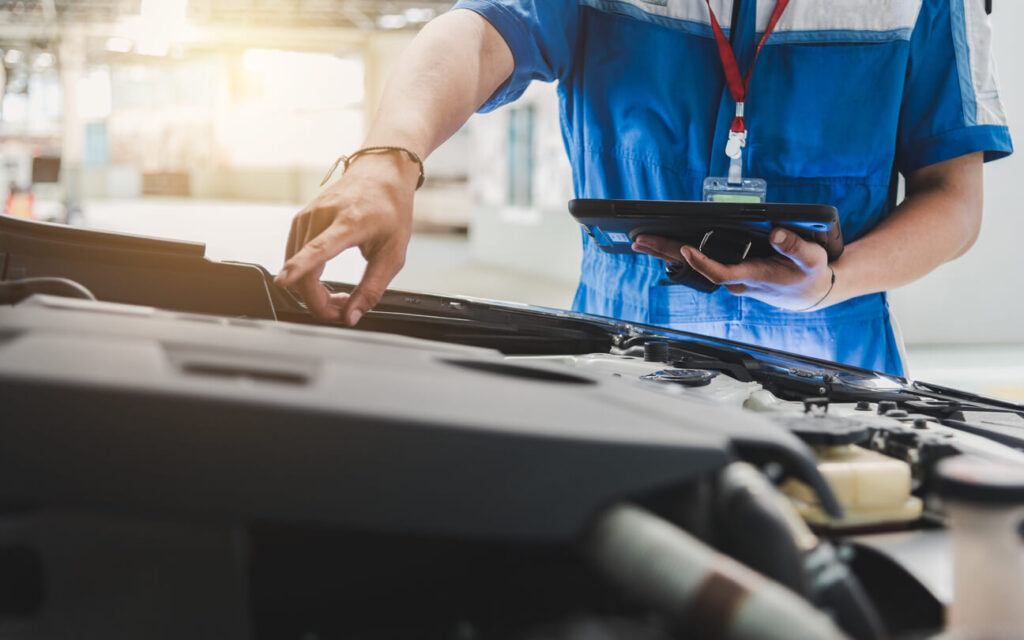If you’re looking to drive in the great state of Texas, you must be ready to have your vehicle inspected. This vehicle inspection applies whether you’re new to the area or are a long-time resident. You must know these requirements to ensure your vehicle complies with Texas car inspection laws. You must also understand the consequences of failing to meet these requirements.
Texas uses a “Two Steps One Sticker” system, which combines inspection with auto registration. First, your car must pass the annual safety inspection. Then you can renew the registration and obtain a dated inspection window sticker.
Annual Inspection Required in Texas
In Texas, most vehicles have to undergo a safety inspection annually. The inspection must be completed within 90 days of a vehicle’s registration renewal date.
Some counties in Texas also require emissions inspections. However, there are some exemptions for emissions testing on new vehicles. If you own a car and have an original registration, your new vehicle will be exempt from emissions inspection and testing.
However, this exemption does not apply to new residents. If you are new to Texas, your car must pass a safety inspection and pass an annual emissions test within 30 days of moving to one of the required testing areas of the state.

What Is Checked at a Car Inspection in Texas?
A licensed inspector checks the vehicle’s safety features during a car inspection in Texas. This inspection covers various safety-related components, including but not limited to the following:
- Lights: Headlights, stop lights, indicator lights, and hazard lights are all checked to confirm that they are functioning correctly.
- Braking System: The foot and parking brakes are inspected to ensure they work correctly.
- Wheels: Wheel components such as tire tread depth are inspected to confirm they meet safety standards.
- Mirrors: All mirrors, including side and rearview mirrors, are checked to ensure they are appropriately adjusted with no damage.
- Windows: Window tint and window coating are examined to confirm they are within legal limits.
- Horn: The horn is checked to ensure its working condition.
- Seatbelts and Airbag systems: These are checked for functionality to ensure they meet safety standards.
- Exhaust System: The exhaust system is checked for leaks and other issues that could impact the vehicle’s safety.
- Gas Cap: The gas cap is checked to ensure it is fully functional.
- Steering System: The steering system and all of its components are checked to ensure no issues could lead to steering failure.
Where Do Car Inspections Take Place in Texas?
Car inspections can be completed at different locations throughout Texas, including licensed inspection stations, repair shops, and some dealerships. The Texas Department of Public Safety has a list of approved inspection stations.
By going to an approved inspection station, you can be sure your vehicle will receive a thorough inspection that meets Texas’s safety standards. Choosing an inspection station approved by the state of Texas will also ensure you have the sticker and documentation you need to renew your vehicle’s registration.

How Much Does an Annual Vehicle Inspection Cost?
In Texas, the cost of vehicle inspections and registration fees can differ depending on the vehicle’s age. For automobiles that were made between 2 and 24 years ago, the standard cost of an inspection is $25.50, and this fee must be paid at the inspection station.
The registration fee of $14.25 must be paid when you register, bringing the total to $39.75. Vehicle owners driving a 25-year-old vehicle are eligible for a safety-only inspection. This type of inspection costs $7.00 at the inspection station. There is a registration fee of $7.50 for this inspection, bringing the total to $14.50.
These fees are subject to change and can be different depending on the vehicle you want to register and have inspected. We recommend checking with the Texas Department of Motor Vehicles for the most up-to-date information.
How Long do Inspections Take?
Typically, the time required to complete a car inspection in Houston, TX, can vary due to a few factors. These factors include the amount of waiting time at inspection stations and any potential repairs that need to be addressed. However, car inspections in Houston usually take approximately 15 to 30 minutes to finish.
What Do Texas Residents Need to Bring to Their Inspection?
There are some essential documents and items that Texas residents need to bring with them to the inspection.
Photo ID: A government-issued photo ID that is valid and up-to-date is required. Most inspection stations will accept Texas IDs and IDs from other states.
Proof of Insurance: You must show proof of an auto insurance policy at your inspection time.
Payment Method: You must pay for your inspection whether your vehicle passes or fails. You can generally expect to use cash, debit, or a credit card to pay for the inspection.
If you arrive at the inspection station without all of the necessary documentation, you will not be able to complete the inspection process.
What Happens at a Vehicle Safety Inspection in Texas?
The vehicle will fail the inspection if any of the components mentioned earlier are confirmed to be defective or not meeting the state’s requirements.
Once a driver is made aware of what failed the inspection, the driver will need to have those faulty parts or systems repaired. After the necessary repairs are made, the vehicle must be inspected again before it can be registered or renewed.
Once the vehicle passes the inspection, the driver will be given a sticker that must be placed on the vehicle’s windshield. The driver will also receive documentation confirming the car has passed the inspection.
If any driver fails to submit this documentation, the vehicle’s registration cannot be renewed. When renewing the vehicle’s registration, the documentation will need to be submitted to the state.
Common Reasons for Failing Annual Vehicle Safety Inspections
A vehicle safety inspection can fail for a variety of reasons, including:
Tire Wear and Tear
Tires with significant wear and tear can increase the risk of losing control of the vehicle, leading to severe injuries or death. Inspectors will check the tire treads during the inspection. If the inspectors discover that the tire treads are too low, the vehicle will fail the inspection.
Defective Brakes
The brake system is essential to a vehicle’s safe operation, especially when you have to stop suddenly. Defective brakes or following too closely can cause accidents, injuries, and death, so inspectors check all brake components. If any component of your brakes fails, the vehicle will not pass the inspection.
Nonfunctioning Lights
It would be best to have your car’s lighting function properly because your lighting system impacts your ability to see the road, signal where you plan to turn, and avoid accidents. Vehicles with broken lights, lights that are burned out, or lights that are misaligned can compromise the safety of everyone on the road and pedestrians. Inspectors will fail the vehicle if they notice lights that are not functioning correctly.
Cracked or Obstructed Windshield
The windshield is used to do more than protect drivers and passengers from wind, dust, and debris. The windshield gives drivers and passengers a clear view of the road. If the windshield is cracked or chipped in any area within the driver’s view, it can increase the risk of accidents because the driver cannot see clearly. A vehicle will fail if the inspector finds cracks that surpass the allowable limits.
Damaged Wiper Blades
Windshield wipers keep the windshield free of rain, snow, sleet, etc. When the blades are worn out, torn, bent, or cracked, their ability to clear the windshield will be limited. Inspectors will only pass a vehicle if the wiper blades are fixed and working correctly.
Excessive Window Tint
While window tinting is legal in Texas, it must follow the rules concerning darkness, reflectivity, and placement. If the tint is too dark, especially on the front side windows, it can impact the driver’s visibility. The inspector will fail the vehicle if the tint exceeds the legal limits.
What are the Penalties for Driving Without Passing an Inspection in Texas?
Driving without passing an inspection in Texas can lead to various penalties and consequences. Firstly, if a vehicle fails to pass its mandatory inspection before its expiration date, the owner is prohibited from legally operating the vehicle on the road until it successfully completes the inspection. Failure to comply with this requirement can result in penalties, including fines of up to $105 in Houston, TX along with court fees and impoundment fees if pulled over by law enforcement.
Moreover, operating an unregistered vehicle in Texas can carry even more severe penalties. In addition to the fines and impoundment fees mentioned earlier, the owner may face a fine for driving an unregistered vehicle.
It is important to note that these penalties are in place to ensure that vehicles meet the minimum safety and emission standards set by Texas law. By enforcing the inspection and registration requirements, the state aims to promote road safety and ensure that all vehicles on the road adhere to the necessary standards for the well-being of all motorists and pedestrians.
Can You Appeal a Failed Inspection?
To appeal the results of a car inspection in Texas, an owner who believes that their vehicle was wrongly failed has the right to take certain steps. Within 30 days of the failed inspection, the owner must file an appeal along with supporting evidence of attempted repairs conducted at a facility authorized by the state. By following these necessary procedures, individuals can initiate the appeals process for their car inspection results in Texas.
Is Texas Doing Away with Inspections?
Texas lawmakers have recently discussed the prospect of discontinuing the vehicle safety inspection program in the state. However, as of March 31, 2023, the Texas Senate Transportation Committee has declined the proposal to eliminate the program, signaling that Texas is not getting rid of vehicle inspections at this time.
How Often do Commercial Vehicles in Houston need to be Inspected?
Commercial vehicles registered in Houston need to undergo inspections every six months, as per the regulations imposed in Texas.
Read More: Attorney for Negligent Maintenance of a Tractor-Trailer
Ensuring Safety on the Road with Regular Vehicle Inspections
Vehicle inspections can help identify potential problems with a vehicle that could cause an accident, making them an essential part of accident prevention. If an accident does occur, having a car with a valid inspection can be critical.
If a car is found to have expired inspection stickers, it could lead to significant legal and financial consequences for the driver. If a mechanical problem had caused the accident, it would have been identified during an inspection. In that case, the driver could be held liable for any damages or injuries resulting from the accident.
If you’re looking for guidance on vehicle inspection laws in Texas or need help after being involved in an accident, trust the car accident attorneys in Houston at Baumgartner Law Firm.
Our personal injury attorneys in Houston have the necessary experience and knowledge to help you every step of the way. Speak to one of our personal injury attorneys today at (281) 587-1111.
Call Baumgartner Law Firm for Help with an Injury Car Wreck
Call our Auto Accident Attorneys in Houston for a Free Consultation about an accident in Houston, TX.
6711 Cypress Creek Pkwy, Houston, TX, 77069
(281) 587-1111.
Related Posts:
How Texas Car Accident Injury Claims Are Different With Company Vehicles
How On-Board Computer Data Can Help Your Texas Car Accident Case
What are my Rights After Getting Hurt in an Accident with a Commercial Vehicle?
Common Out-Of-Service Violations of Semi-Trucks
Car Insurance Lawyer in Houston
